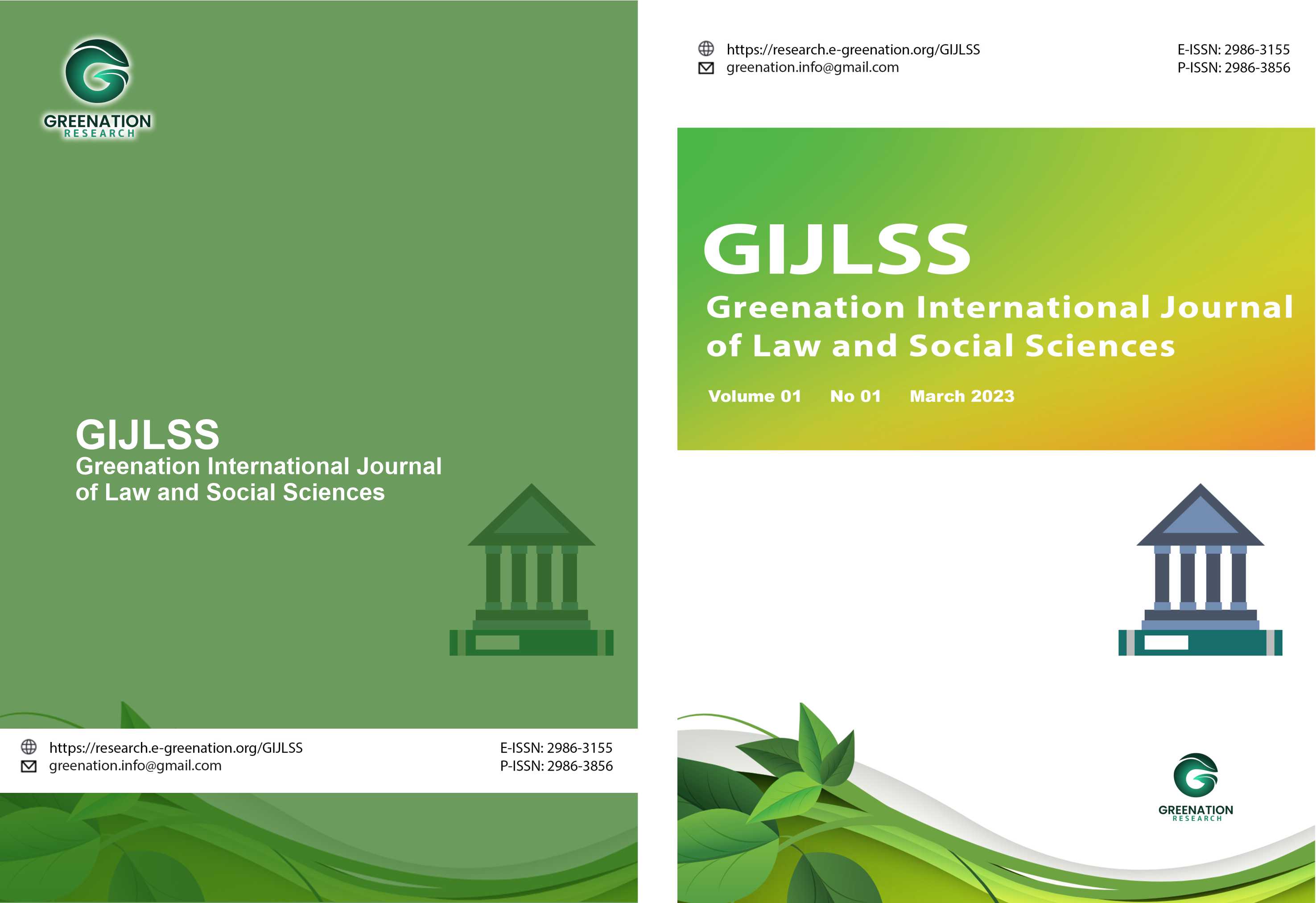Ethics and Accountability in Education: Tackling Corruption and Cultivating Integrity Through Values-Based Education
DOI:
https://doi.org/10.38035/gijlss.v3i3.515Keywords:
Values-based education, Integrity, Corruption, Tertiary institutions, Quantitative surveyAbstract
Corruption and a lack of integrity pose significant challenges to the credibility and effectiveness of educational institutions. These issues undermine academic standards, erode public trust, and can have long-term negative effects on societal development. In response to these pervasive problems, this study investigated the effectiveness of values-based education and ethics-focused curricula as tools for tackling corruption and fostering integrity in tertiary institutions in Anambra State. The study used a quantitative survey to examine the impact of values-based education on ethics and corruption within tertiary institutions in Anambra State. A sample of 140 students was selected through stratified random sampling. Data was collected using a structured questionnaire with a 4-point Likert scale. The survey measured perceptions on the role of values-based education, the manifestation of corruption, and the influence of ethics curricula and policies. Statistical analysis was conducted using SPSS, employing the Chi-Square Test of Independence, directional measures like Lambda, and symmetric measures like Cramer's V to determine associations between variables. Findings revealed a significant, positive relationship between values-based education and promoting ethical behavior among students. However, the study failed to find a statistically significant association between corruption's direct impact on teaching or the influence of broad ethical policies. The results suggest that while direct educational interventions are effective, the implementation and enforcement of institutional policies may require further investigation. The study recommends that future research use mixed-methods to gain a more comprehensive understanding of these dynamics.
References
Abuzar, M., & Khondoker, S. U. A. (2024). Ethical curriculum development: Insights from Islamic epistemology towards sustainable development goals (SDGs). Profetika: Jurnal Studi Islam, 25(02), 273-286.
Aristotle-Isaac, J., & Bubarayi G, I. (2025). Quality Education in A Corrupt University System in Nigeria. Journal of Social Science, 2(3).
Barber, E. (2016). Case study: Integrating TEFI (Tourism Education Futures Initiative) core values into the undergraduate curriculum. In The Tourism Education Futures Initiative (pp. 228-265). Routledge.
Ezeaku, S. N., & Ohamobi, I. N. (2016b). Work ethics of secondary school principal and quality academic performance. COOU Journal of Educational Research and Development (COOUJERD), 1(1), 253–268.
Iloka, P. C. (2025). Teaching Integrity: Strategies for Fostering Ethical Behavior in Students. UNIZIK Journal of Educational Research and Policy Studies, 19(1).
Khadijah, K., Suciati, I., Khaerani, K., Manaf, A., & Sutamrin, S. (2021). Schools’ character education values and students’ mathematics learning achievement: A meta-analysis. Cakrawala Pendidikan, 40(3), 670-683.
Martinez, J., & Partin, J. (2023). Character education initiatives and preparation for school administrators: A review of literature. Journal for Leadership, Equity, and Research, 9(1).
Munro, C., & Kirya, M. (2020). Values education for public integrity: What works and what doesn’t. Bergen: Chr. Michelsen Institute (CMI).
Nurasiah, I., Sumantri, M. S., Nurhasanah, N., & Casmana, A. R. (2022, May). Cultural values' integration in character development in elementary schools: the sukuraga as learning media. In Frontiers in Education (Vol. 7, p. 849218). Frontiers Media SA.
Ohamobi, I. N., & Ezeaku, S. N. (2016a). Students’ engagement variables as correlates of academic achievement in Economics in senior secondary schools in Anambra State, Nigeria. International Journal of Science and Research, 8(2319–7064).
Ohamobi, I. N., & Ofojebe, W. N. (2019). Teachers’ perception of principals’ leadership styles on value reorientation for sustainable national development. Ilorin Journal of Education, 38.
Ohamobi, I. N., Anyaeche, I. C., Oguejifor, C. S., Obi, I. E., & Anyaeche, I. C. (2024b). Professional development of teachers as correlate of teachers’ job commitment in public secondary schools in Anambra State. Journal of Higher Education Theory and Practices, 24 (2), 63–73.
Ohamobi, I. N., Manafa, I. F., & Osegbue, G. C. (2020). Curriculum implementation in secondary school on national cohesion and global competitiveness. Journal of Contemporary Education Research, 20 (8), 30–40.
Onyekazi, P. I., Ohamobi, I. N., Osegbue, G. C., Oguejiofo, C. S., & Anagor, N. A. (2024a). Principals’ stress management techniques as correlates of teachers’ task performance in public secondary schools in Anambra State, Nigeria. Educational Administration: Theory and Practice, 30 (5), 14776–14783.
Organisation for Economic Co-operation and Development (OECD). (2021). Embedding values and attitudes in curriculum. OECD Publishing. Retrieved 11/09/25 from https://www.oecd.org/education/embedding-values-and-attitudes-in-curriculum.pdf.
Osegbue, C. G., Ohamobi, N. I., & Manafa, F. I. (2018). Principals’ motivational strategies for enhancing secondary school teachers’ productivity in Anambra State. UNIZIK Journal of Educational Management and Policy, 2 (1), 139–147.
Poszler, F., Portmann, E., & Lütge, C. (2025). Formalizing ethical principles within AI systems: experts’ opinions on why (not) and how to do it. AI and Ethics, 5(2), 937-965.
Transparency International. (2013). Global corruption report: Education.Routledge/Transparency International. Retrieved 11/09/25 from https://images.transparencycdn.org/images/2013_GCR_Education_EN.pdf
United Nations Office on Drugs and Crime (UNODC). (2025). Module 9: Corruption in education (E4J University Module Series). Retrieved 11/09/25 from https://grace.unodc.org/grace/uploads/documents/academics/Anti-Corruption_Module_9_Corruption_in_Education.pdf
Whang, N. Y. (2023). Causes and consequences of corruption in schools: The role of prevention and control promoted by leaders’ moral impetus. SAGE Open, 13(3), 21582440231192110.
Downloads
Published
How to Cite
Issue
Section
License
Copyright (c) 2025 Adaobi Jennifer Iloakasia

This work is licensed under a Creative Commons Attribution 4.0 International License.
Copyright :
Authors who publish their manuscripts in this journal agree to the following conditions:
- Copyright in each article belongs to the author.
- The author acknowledges that the Greenation International Journal of Law and Social Sciences (GIJLSS) has the right to be the first to publish under a Creative Commons Attribution 4.0 International license (Attribution 4.0 International CC BY 4.0).
- Authors can submit articles separately, arrange the non-exclusive distribution of manuscripts that have been published in this journal to other versions (for example, sent to the author's institutional repository, publication in a book, etc.), by acknowledging that the manuscript has been published for the first time at GIJLSS.























